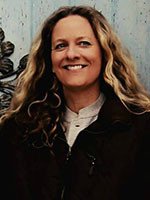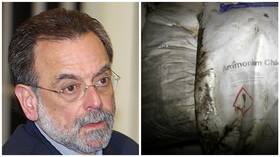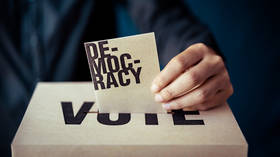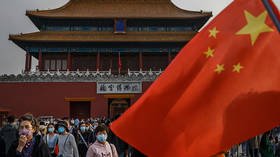The UK & US alliance brings the UNSC into disrepute by banning Syria chemical weapons briefing from ex-OPCW head
In an extraordinary effort by the UK, US, and their allies to censor the former OPCW director general, José Bustani was not allowed to brief the UN Security Council on the alleged chemical weapons attack in Douma, Syria, in 2018.
Bustani had been invited by Moscow to give his opinion on the “Syrian chemical dossier” at the UNSC meeting on October 5, 2020. Bustani, a Brazilian diplomat, was director general of the OPCW from 1997 until 2002. Towards the end of his tenure, immense pressure to force his resignation came from the Bush administration. His negotiations with Iraq to allow OPCW weapons inspectors to make unannounced visits threatened Washington’s “regime change” rationale.
Bustani recalls that John Bolton, a member of Bush’s staff, gave him 24 hours to leave the organization and informed him, “If you don’t comply with this decision by Washington, we have ways to retaliate against you. We know where your kids live.” Bustani once again braved the intimidation of the UK and US when he decided to present his views at the UNSC and to stand in solidarity with the ostracized OPCW experts who have spoken out about what they believe to be grave irregularities and suppression of evidence in the OPCW reporting of the Douma events.
The Council today faced incredible disgrace when US, UK and other Western countries shamelessly tried to shut the mouth of former #OPCW Director General Jose #Bustani. This is a clear proof of how they in reality “care” for the truth and transparency #Syria#DoubleStandardshttps://t.co/0PMB3Iyg04
— Dmitry Polyanskiy (@Dpol_un) October 5, 2020
The UK and US forced the presiding chair of the UNSC, Ambassador Vassily Nebenzia, to put the proposal of Bustani’s briefing to a vote. The US, the UK, France, Germany, Belgium, and Estonia voted against it, blocking the move. Nebenzia’s frustration was palpable – he accused the six nations of making history by prohibiting a briefer proposed by the UNSC president and called the move to deny transparency a “shame and disgrace.” Nebenzia reverted to his national capacity to read out the banned statement, which ensured that it would be recorded in the meeting archives. Bustani then released a video recording of his statement:
UK envoy Jonathan Allen claimed that, despite his history of involvement with the OPCW, Bustani was not able to “provide relevant knowledge or information.” US envoy Kelly Craft accused Russia of shielding the Syrian “regime” from accountability and of attempting to sow confusion and disinformation about the professionalism of the OPCW.
The evident reality is that the UK and the US are erecting a diplomatic firewall to deny the presentation of evidence that would expose the OPCW as compromised and its report on Douma as a fraudulent effort to retrospectively justify UK, US, and French unlawful aggression against Syria days after the alleged Douma event and long before a “dodgy dossier” had been produced. They are censoring OPCW investigation team members and Bustani to keep together the unraveling narrative that has underpinned their war effort in Syria just as weapons of mass destruction had done previously in Iraq.
Bustani argued for the importance of an organization such as the OPCW, but stressed that trust in it can be restored only by their displaying the utmost transparency in their presentation of evidence and their treatment of the dissenting inspectors. He stated: “If the OPCW is confident in the robustness of its scientific work on Douma and in the integrity of the investigation, then it has little to fear in hearing out its inspectors.” He went on to say that if the allegations of “evidence suppression, selective use of data and exclusion of key investigators” are not unfounded, “then it is even more imperative that the issue be dealt with openly and urgently” to restore confidence in the organization.
Bustani’s statement was balanced and rational. The response of the UK, US, and German envoys, in particular, demonstrated the paucity of counter-evidence from member states who rely upon the OPCW to bolster their criminalization of the Syrian government and its allies and to validate the need for military intervention and a savage regime of economic sanctions against Syria. They reverted to their default position of “bad Assad gassing his own people” without a single nod in the direction of Bustani’s testimony.
Craft’s statement did not register Bustani’s requests or findings, nor did she acknowledge the fortitude of the OPCW inspectors, who have upheld their principles and spoken out against what they believe to be a serious misrepresentation of science. Instead, she condemned the September 29 informal ‘Arria-formula’ meeting on chemical weapons in Syria as a “particularly appalling” effort by Russia to “sow confusion and distract from the truth”.
Craft ignored the integrity of Ian Henderson, a former OPCW inspection team leader, who spoke at the Arria meeting. Henderson described the mismanagement of the investigation, the evidence lockdown, and the concerns of other Douma Fact-Finding Mission (FFM) inspectors who claim that the conclusions in the final FFM report do not reflect the actual situation in Douma.
Both Bustani and Henderson are calling for a transparent technical enquiry to clarify the facts about Douma. They are calling for the OPCW to adhere to scientific rigor and principles in order to repair its damaged reputation.
Bustani voiced strong solidarity with the besieged dissident inspectors and directed his plea for a fair hearing of their concerns to the current director general of the OPCW, Fernando Arias. To date, the OPCW has stonewalled the inspectors and doubled down on the questionable final Douma report with the backing of the interventionist alliance at the UNSC.
The dissenting inspectors are defending science, not politics. The OPCW and the UN member states it appears to represent depend on a distorted science to defend their corrupted politics. While one side can argue their case with a clear conscience, the other can only circle its wagons around the claims it has upheld to manufacture consent for yet another “humanitarian” war – a barely concealed regime change mission that has been ongoing since 2011.
Dag Hammarskjöld, a former secretary general of the UN, described by US President John F. Kennedy as the “greatest statesman of our century”, addressed Cambridge University in 1958 and said:
“The ultimate fight is the one between the human and the subhuman. We are on dangerous ground if we believe that any individual, any nation, or any ideology has a monopoly on rightness, liberty, and human dignity.”
By that standard, the UK, the US, and their allies have drifted far into subhuman territory by denying a voice to the humans in this world who speak up above the storm of lies to defend justice, liberty, and universal dignity because they believe in that tiny spark of integrity that defines courage at a time when speaking truth to power is a perilous undertaking.
The statements, views and opinions expressed in this column are solely those of the author and do not necessarily represent those of RT.

















